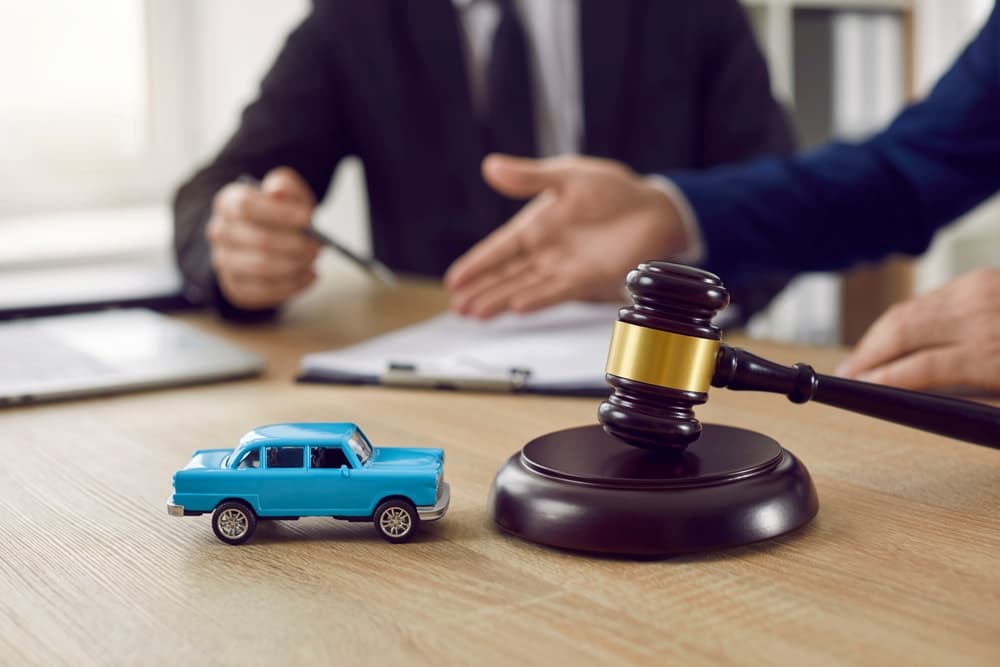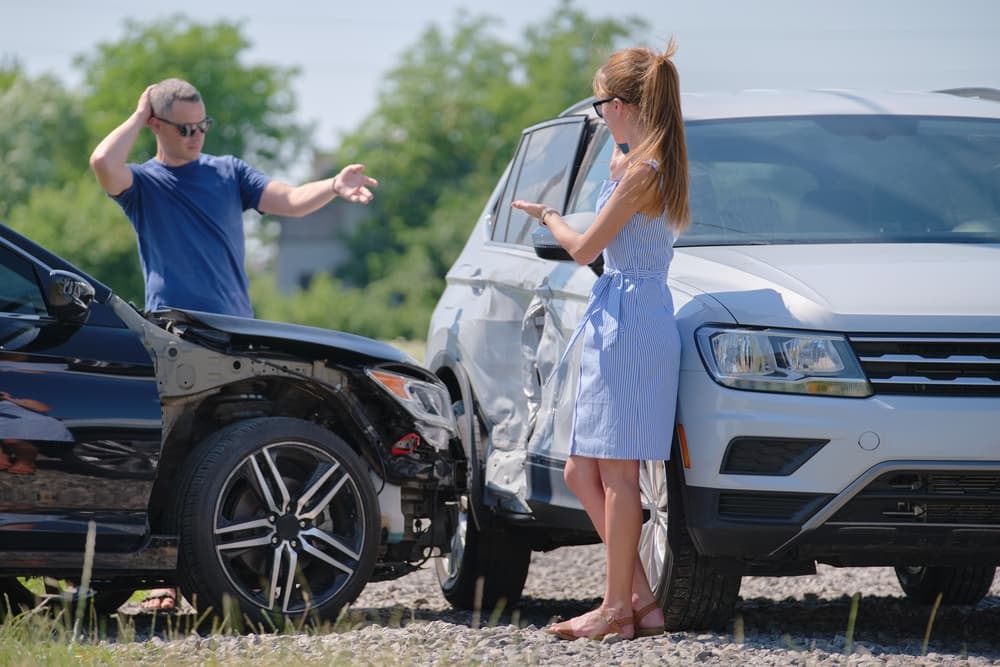
When it comes to car accident claims, going to court is pretty uncommon, according to the available data. It's estimated that a whopping 90-99 percent of personal injury cases in Fort Lauderdale and across the country end up settling out of court. Only a tiny fraction, somewhere between 1 percent and 5 percent, actually wind up before a judge or jury.
We can get some insight from another state’s data—California’s Court Statistics Report. The report keeps tabs on motor vehicle cases involving accidents causing at least $25,000 in damages. In the most recent data, 44,554 personal injury cases related to car accidents were filed in the state during the 2020-2021 fiscal year. Surprisingly, only 181 of those made it to the courtroom—that's just 0.4 percent. However, it's worth noting that measures taken to combat the spread of COVID-19 likely influenced these numbers.
Going back to the report, released before the era of COVID shutdowns, there were about 30,000 personal injury cases related to vehicle accidents that year. Out of those, roughly 700 ended up being decided by the courts—about 2 percent of the total cases.
So, in other words, accident cases rarely go to court. In most cases, they are resolved through settlements.
If you or a loved one has been injured in a car accident, reach out to an experienced car accident lawyer in Fort Lauderdale for assistance.
Reach Out Today!
What is a Settlement?
In a car accident case, a settlement refers to an agreement reached between the parties involved (typically the person who has suffered harm or damage and the insurance company of the party at fault) to resolve the claim without going to trial.
This agreement usually involves the payment of a certain amount of money to the injured party or the party that has suffered damages, in exchange for dropping any further legal action related to the accident.
Settlements can occur at various stages of a legal process:
- Pre-litigation Settlement: Often, settlements are reached before a lawsuit is even filed. After the accident, the injured party or their attorney may negotiate directly with the insurance company to reach a satisfactory compensation amount.
- During Litigation: If the initial negotiation does not result in a settlement, the injured party may file a lawsuit. However, both parties can continue to negotiate a settlement even while the lawsuit is pending. Settlements during this phase are common as more information becomes available through the discovery process, and both sides get a clearer picture of the strengths and weaknesses of their case.
- Mediation or Arbitration: Sometimes, a third party, like a mediator or arbitrator, is involved to help reach a settlement. This is a more formal negotiation process but still occurs outside of a courtroom trial.
- On the Eve of Trial or During Trial: It's not uncommon for settlements to be reached on the very doorstep of the courtroom, or even after a trial has begun, as the pressure of pending judgments can motivate parties to compromise.
The settlement amount typically covers various damages, such as medical expenses, lost wages, and pain and suffering. However, the specifics vary depending on the nature of the accident and the injuries sustained.
Why Settlements Are Generally Preferred Over Court Trials
Settlements are often preferred by all parties involved for several reasons:
- Cost-Effectiveness: Going to court can be expensive. Legal fees, court costs, and the time it takes for a case to move through the legal system can add up quickly.
- Time Efficiency: Court cases can take months or even years to resolve, while settlements can often be negotiated in a fraction of the time.
- Predictability: Settlements provide a certain outcome that both parties agree upon, whereas court cases can be unpredictable.
Why Car Accidents Go to Court
While most cases are settled out of court, there are circumstances when going to trial is necessary or beneficial. These situations may include:
- Disputes over Fault: A court trial may be necessary if there is significant disagreement over who is at fault for the accident.
- Unsatisfactory Settlement Offers: If the insurance company's settlement offer is too low and does not cover the full extent of damages, taking the case to court might secure fair compensation.
- Severe Injuries and Damages: In cases involving severe injuries or wrongful death, the stakes are higher, and the parties may be more inclined to go to court to seek justice.
What Happens if Car Accident Claims Don’t Go to Trial?
Some cases get thrown out for reasons like not fitting within Florida’s two-year time limit for filing claims. But most of the time, they get sorted out when the person who got hurt and the other side, usually the insurance company of the person who caused the accident, come to an agreement.
Nobody really likes going to court because it takes a long time and costs a lot of money. Trials can drag on for weeks or even months, and getting experts and investigating the scene of the accident can really add up in terms of expenses.
That's where having a lawyer can help. They can determine how much your injuries are worth and negotiate with the insurance company to get you the maximum compensation possible. And if things can't get settled fairly, your lawyer can stand up for you in court.
What Happens if My Car Accident Case Does Go to Trial?

If your car accident case ends up in court—which is pretty unusual—there's a lot that happens leading up to the trial. Here are the main steps you might go through:
Discovery
This is when your lawyer starts gathering all the evidence for your case. They'll interview witnesses, review the police report, inspect the accident scene, figure out how much your damages are worth, and check out the laws related to your situation.
Negotiations
Once your case is built, your lawyer will try to settle things outside of court by talking to the at-fault party and their insurance company. The goal is to agree on a fair amount of compensation that covers all your accident-related losses. If both sides can agree, you'll get paid without having to go to trial. But if they can't agree, the case moves forward to trial.
Arguments & Trial
Now it's time for the courtroom drama. Your lawyer will make arguments to support your side, present evidence, and maybe even bring in experts to testify about the accident or your injuries.
Verdict & Award
After hearing from both sides, the jury decides who wins the case. If they rule in your favor, they'll also decide how much compensation the at-fault party has to pay you.
While going to court for a car accident case is pretty rare, there's always a chance that both sides could settle things fairly at any point during the process. No matter what happens, your lawyer will be by your side, fighting to make sure you get the compensation you deserve.
How Long Will a Car Accident Trial Take?
Figuring out how long a car accident trial will last can vary based on a few different things, like:
- How many people you are suing
- How badly you were hurt
- How strong your evidence is
- How strong the other side's evidence is
- How many witnesses there are
- Who's to blame, and by how much
In Florida, who's at fault is a big deal in car accident cases because the state follows a modified comparative negligence rule. Insurance companies and courts may use this rule to devalue or deny you compensation if they deem you were at least partly responsible for the accident and your injuries.
Florida’s Modified Comparative Negligence Standard
Comparative negligence is a legal principle used in personal injury cases, including car accidents. It's all about assigning responsibility when more than one party is at fault for an accident. Instead of simply saying one person is entirely to blame, it allows for a more nuanced approach.
Under comparative negligence, the court looks at the actions of each party involved in the accident and determines the percentage of fault for each.
Florida follows a specific version of comparative negligence known as modified comparative negligence with a 50 percent bar. If you're found to be equally or more at fault than the other party (50 percent or more), you can't recover any damages at all. This is where the "bar" comes in—it bars you from recovering damages if you're equally or more responsible for the accident.
But, in Florida, you can still seek compensation for your injuries in a car accident even if you were partially at fault, as long as your fault doesn't exceed 50 percent of the total blame.
What Compensation is Available in a Florida Car Accident Claim?
In a Florida car accident claim, several types of damages may be available to compensate the injured party for their losses.
These may include:
- Medical Expenses: This includes past and future medical bills related to the accident, such as hospitalization, surgery, doctor's visits, medication, rehabilitation, and therapy costs.
- Lost Income: Compensation for income lost due to the inability to work because of injuries sustained in the accident. This can include wages lost during recovery as well as any future loss of earning capacity.
- Property Damage: Covers the cost of repairing or replacing damaged property, such as your vehicle, as a result of the accident.
- Other Financial Losses: Any other out-of-pocket expenses directly related to the accident, such as transportation costs to medical appointments or home care expenses.
- Pain and Suffering: Compensation for physical pain, emotional distress, and mental anguish caused by the accident and resulting injuries.
- Loss of Enjoyment of Life: Compensation for the loss of enjoyment of activities or hobbies that the injured party can no longer participate in due to their injuries.
- Loss of Consortium: Compensation for the impact the injuries have on the injured person's relationship with their spouse or family members, including loss of companionship, affection, and support.
- Permanent Disability or Disfigurement: Compensation for any permanent injuries or scarring resulting from the accident that affects the injured party's quality of life or appearance.
There are specific rules and limitations on damages in Florida, so consulting with an experienced personal injury attorney is crucial to understanding your rights and options for seeking compensation after a car accident.
Discuss Your Car Accident Case with a Trusted Lawyer at Blakeley Law Firm
At Blakeley Law Firm, we are committed to our clients' well-being and justice. We strive to negotiate the best possible settlements, but we are also prepared to take a car accident case to court if it means securing the rightful compensation for our clients.
With years of experience in personal injury attorney in Fort Lauderdale, Florida, our Fort Lauderdale car accident attorneys understand the local legal landscape and how to navigate it effectively.
While the prospect of going to court can be daunting, understanding that it is relatively rare for car accident claims to reach this stage can be reassuring. However, each case is unique, and the decision to settle or go to court should be made with the guidance of experienced legal professionals.
At Blakeley Law Firm, we are here to provide that guidance, advocate for your rights, and ensure the best possible outcome for your case. Contact us today at (954) 253-9445 or through our online form for your free consultation.